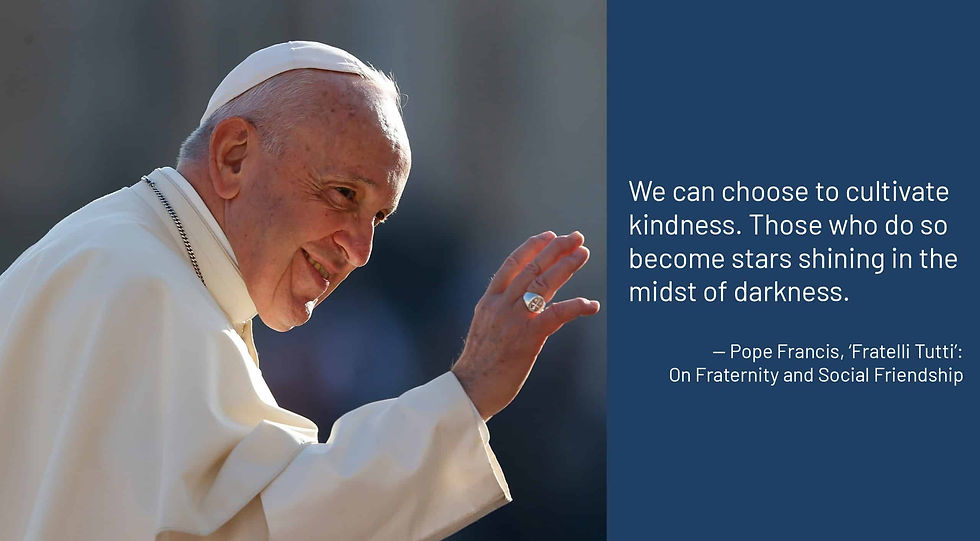This week's story from Matthew's Gospel is challenging. It is about the expansion of Jesus' saving love beyond the Jewish community to include the Gentiles or people from the non-Jewish world. This is the gift of saving love that has reached us in the Western world and here in Ireland trough saints like St Patrick. And so we are grateful for this feature of divine love that is not contained or controlled by boundaries and borders. In the Gospel account, Jesus' encounter with the Gentile woman leads to her daughter being healed which made it abundantly clear that the saving mercy of Christ was destined as a gift for everyone, especially for those who were excluded from it before. The most important ingredient to make this happen is faith. In the extracts below from 'Fratelli Tutti' - Pope Francis' encyclical on fraternity and social friendship, the pope reflects on what happens when we encounter people who are different to us. He also talks about the need for human kindness to form bonds of communion and charity - an essential message for today's polarised world.

'I cannot reduce my life to relationships with a small group, even my own family; I cannot know myself apart from a broader network of relationships, including those that have preceded me and shaped my entire life. My relationship with those whom I respect has to take account of the fact that they do not live only for me, nor do I live only for them. Our relationships, if healthy and authentic, open us to others who expand and enrich us. Nowadays, our noblest social instincts can easily be thwarted by self-centred chats that give the impression of being deep relationships. On the contrary, authentic and mature love and true friendship can only take root in hearts open to growth through relationships with others. As couples or friends, we find that our hearts expand as we step out of ourselves and embrace others. Closed groups and self-absorbed couples that define themselves in opposition to others tend to be expressions of selfishness and mere self-preservation' (Fratelli Tutti, 89).
'Kindness frees us from the cruelty that at times infects human relationships, from the anxiety that prevents us from thinking of others, from the frantic flurry of activity that forgets that others also have a right to be happy. Often nowadays we find neither the time nor the energy to stop and be kind to others, to say “excuse me”, “pardon me”, “thank you”. Yet every now and then, miraculously, a kind person appears and is willing to set everything else aside in order to show interest, to give the gift of a smile, to speak a word of encouragement, to listen amid general indifference. If we make a daily effort to do exactly this, we can create a healthy social atmosphere in which misunderstandings can be overcome and conflict forestalled. Kindness ought to be cultivated; it is no superficial bourgeois virtue. Precisely because it entails esteem and respect for others, once kindness becomes a culture within society it transforms lifestyles, relationships and the ways ideas are discussed and compared. Kindness facilitates the quest for consensus; it opens new paths where hostility and conflict would burn all bridges' (Fratelli Tutti, 224).
Comments